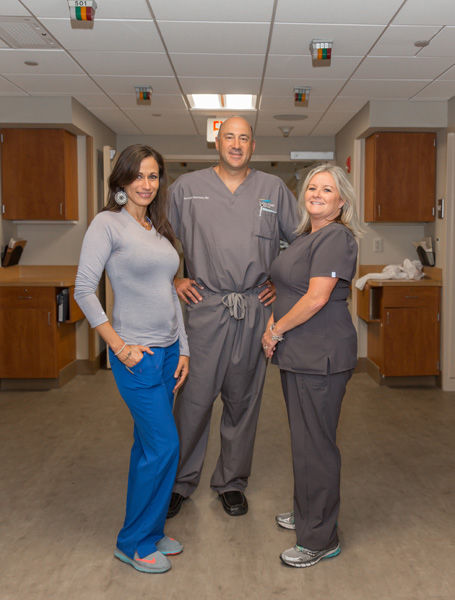Dr. Richard Steinfeld, an orthopedic surgeon at Indian River Medical Center, can’t help but crack a smile when the topic of the hospital’s “joint camp” comes up.
“There are patients that are brought to the joint camp before surgery and then after surgery to rehab their joint replacements,” says Steinfeld. “From our perspective, the joint camp offers a comprehensive approach to recovery from what’s, hopefully, a life-changing procedure that helps patients regain their quality of life.”
The University of Michigan’s Health System agrees, saying “the specialized care . . . that patients receive in these [joint camp] programs leads to faster recovery times, higher patient satisfaction, lower risk of infection and improved clinical outcomes.”
A quick look at the numbers issued by a federal agency with way too long a name – the National Institute of Arthritis and Musculoskeletal and Skin Diseases at the National Institutes of Health – shows why that specialized care is an important component of healthcare overall.
Close to 1 million knee replacements, 332,000 hip replacements and well over 54,000 shoulder replacements will be performed in this country this year. At Vero Beach’s Indian River Medical Center alone, upwards of 1,200 such joint replacements are performed annually.
And the numbers are rising. The Centers for Disease Control estimates that by 2030 the number of knee replacements in the U.S. will skyrocket to over 3 million a year, with comparable increases in both hip and shoulder procedures.
The most common culprits behind joint replacement are osteoarthritis and rheumatoid arthritis, which cause chronic and often extreme joint pain.
New technologies and surgical techniques have made joint replacements less traumatic, but despite advances in surgical techniques and prosthetic devices, doctors have learned the success or failure of any joint replacement depends largely on the patient and the coaching he or she gets prior to and after surgery.
That’s the main reason why IRMC launched its joint camp: for the benefit of patients. But better outcomes also help the hospital.
With nearly two thirds of hospitals nationwide now performing joint replacements, the competition for patients is growing, and joint camps have been shown to help hospitals gain or keep a competitive advantage.
Colleen King, manager of the IRMC rehabilitation department, says one of IRMC’s advantages is what she calls the “multi-disciplinary approach” being used at the hospital.
She says joint camp “is an educational session for patients. We take away their fears and let them know what to expect. We go through their whole day in the life of surgery and their hospitalization. Then we touch on what’s going to be expected once they get home, including their therapy as well as the arrangements in their home they have to make.”
Those “arrangements” may include removing throw rugs, making sure frequently used items are placed at waist or shoulder level for easy access, making and freezing meals in advance and arranging for pet care. Campers receive complete pre- and post-op checklists as well as counseling.
IRMC nurse Maria Puras jumps into the conversation, saying “my job, basically, is to take a lot of the anxiety away from the patients and just enhance the experience. As soon as they make an appointment, they come to my class and then we start talking. We tell them what to expect during their stay and then what to expect after. We’re resources. We try to make them as involved as much as we can.”
Puras is also tasked with keeping patients informed about their anesthesia and pain-control medications.
There is an undeniable sense of camaraderie between Steinfeld, King and Puras as they talk about their respective tasks.
While King is keenly aware that pre- and post-operative exercises and rehab are no one’s favorite pastime, she is also aware that in the long run they produce results.
Steinfeld quickly jumps in with an unqualified endorsement for King’s tough task. “Therapy treatments,” he says firmly, “have progressed tremendously over the past 10 to 15 years and have made a tremendous difference in how patients recover.”
All three members of the joint camp team also point to the importance of family members becoming involved in a patient’s rehab and freely admit that even after surgery, there will be some pain. At least for a while.
But according to King, “It’s not the chronic pain they’re used to living with.”
“There is [some post-surgical] pain because there’s still some swelling and edema that goes along with having these surgeries,” King says. “But as those things decrease, your range of motion and your abilities will increase,” provided the prescribed exercises and rehab work are done.
Steinfeld sums up by saying, “The goal of what we do is to relieve the pain of arthritis and to improve function.”
There is no additional fee for joint replacement patients participating in the joint camp program.
For more information, contact the Indian River Medical Center’s Joint Camp at 772-794-2556.

